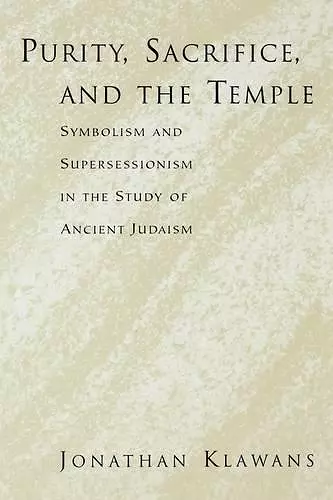Purity, Sacrifice, and the Temple Symbolism and Supersessionism in the Study of Ancient Judaism
Format:Paperback
Publisher:Oxford University Press Inc
Published:13th May '09
Currently unavailable, and unfortunately no date known when it will be back

Ancient Jewish sacrifice has long been misunderstood. Some find in sacrifice the key to the mysterious and violent origins of human culture. Others see these cultic rituals as merely the fossilized vestiges of primitive superstition. Some believe that ancient Jewish sacrifice was doomed from the start, destined to be replaced by the Christian eucharist. Others think that the temple was fated to be superseded by the synagogue. In Purity, Sacrifice, and the Temple Jonathan Klawans demonstrates that these supersessionist ideologies have prevented scholars from recognizing the Jerusalem temple as a powerful source of meaning and symbolism to the ancient Jews who worshiped there. Klawans exposes and counters such ideologies by reviewing the theoretical literature on sacrifice and taking a fresh look at a broad range of evidence concerning ancient Jewish attitudes toward the temple and its sacrificial cult. The first step toward reaching a more balanced view is to integrate the study of sacrifice with the study of purity-a ritual structure that has commonly been understood as symbolic by scholars and laypeople alike. The second step is to rehabilitate sacrificial metaphors, with the understanding that these metaphors are windows into the ways sacrifice was understood by ancient Jews. By taking these steps-and by removing contemporary religious and cultural biases-Klawans allows us to better understand what sacrifice meant to the early communities who practiced it. Armed with this new understanding, Klawans reevaluates the ideas about the temple articulated in a wide array of ancient sources, including Josephus, Philo, Pseudepigrapha, the Dead Sea Scrolls, New Testament, and Rabbinic literature. Klawans mines these sources with an eye toward illuminating the symbolic meanings of sacrifice for ancient Jews. Along the way, he reconsiders the ostensible rejection of the cult by the biblical prophets, the Qumran sect, and Jesus. While these figures may have seen the temple in their time as tainted or even defiled, Klawans argues, they too-like practically all ancient Jews-believed in the cult, accepted its symbolic significance, and hoped for its ultimate efficacy.
Drawing on the fields of anthropology and ritual studies, Klawans unearths the powerful symbolism of the ancient Jewish sacrificial cult. He shows that sacrifice was a spiritually rich and meaningful activity illuminated by two 'organizing principles' central to the priestly traditions of the Bible: the desire to imitate God and the concern to attract and maintain God's presence within the community. In so doing, Klawans disables all previous evolutionist (and more or less hostile) accounts of ancient Jewish sacrifice as a primitive and spiritually empty behavior that was rejected and superseded by the eucharist in Christianity or prayer in rabbinic Judaism. His fresh readings of central New Testament and rabbinic texts challenge foundational assumptions and long-cherished prejudices. * Christine E. Hayes, author of Gentile Impurities and Jewish Identities: Intermarriage and Conversion from the Bible to the Talmud *
ISBN: 9780195395846
Dimensions: 234mm x 156mm x 20mm
Weight: 540g
388 pages